Yes. Paul Gross knows when you hear Movember you think about mustaches and prostate cancer. Which is good. Because Dr Gross certainly wants you thinking dude when you hear Movember.
But. Then he wants you to think even more manly mannish thoughts, thoughts about trauma and violence and anger and depression and poverty and grief: about not going to the doctor, about being an estranged father or son, about addiction, and even about colonization. “If it weren’t for guys’ terrible childhoods,” confesses Dr Gross, “we might not need our DUDES Club at all.”
After you’ve thought about those things, Gross wants you to also think about culture and survival and strength and resilience and reflection and friendship. “The DUDES Club is space for guys to open up. We’re not following a curriculum. Guys tell us what to talk about. Guys share their experiences. And the resilience. Wow. The resilience is amazing.”
In a nutshell, Paul Gross just wants more people thinking more thoughts about men’s health, especially men’s mental health and especially its part of a circle of holistic well-being, inextricable from physical, spiritual, and emotional health.
So Dr Gross began a journey, a journey that started more than half a decade ago in partnership with the Vancouver Native Health Society in British Columbia, with guidance from Musqueam elder Henry Charles, and in conjunction with a group of men from one of Canada’s most notorious postal codes: Vancouver’s Downtown Eastside (DTES).
In its early years, funding was cobbled together by hook and by crook; since November 2013 the DUDES Club has received Movember Foundation support. That support goes far beyond mustaches and prostates. Taking its lead in part from the Black Barbershop Health Outreach Program in the United States, and with leadership from cofounder and Program Manager Richard Johnson, a former Los Angeles–living out-reach worker, the DUDES Club was born. Like the Black Barbershop Health Outreach Program, the DUDES Club takes health out of doctors’ offices and “onto the street.”
“And yes,” laughs Gross, “we do offer haircuts.”
The DUDES Club motto is simple: Leave your armour at the door.
Their objectives are clear: build solidarity and brotherhood between members of the group; promote men’s health through education, dialogue, and health screening clinics; enable men to regain a sense of pride and fulfilment in their lives. Their reach across British Columbia is now substantial, touching the small Wet’suwet’en First Nation village of Moricetown and the northern communities of Smithers and Prince George. The idea has even spread to Fredericton, NB. Still, the DUDES Club maintains an active presence in the DTES. “It’s about going to places where guys feel safe, as opposed to expecting guys to come to our offices. Some doctors are reluctant to do this,” observes Gross. “So many programs are disease focused. You need a diagnosis first, like for diabetes or hep C. For us, you just need to be a guy—and we’re open to the spectrum of gender. We have 2-spirited guys and some trans men. We address depression and suicide but also men’s mental health generally. We love what we do and it fills a gap.”
The gap is that many men, especially men living with intersecting sources of social and health marginalization like poverty, indigeneity, addiction, trauma, and illness, don’t go to doctors. They suffer alone. And they are vulnerable. “Guys were suffering and, even though there’s lots of DTES services, there weren’t any targeted particularly to men,” says Gross matter-of-factly.
Paul Gross is matter-of-fact about other things: “I grew up with a single mother, without a dad, so these stories are my story too.” Another part of Dr Gross’s story is that he has always craved out-of-office work: He’s done global health work in Africa and, as he observes, “I’ve always been interested in First Nations. Colonization has had such negative impacts on indigenous peoples, so now it’s such an honour to work in this field.”
“I did want to be involved in stuff outside the clinic,” says Gross. “Stuff that is really, really empowering. For us all.”
Gross believes that by empowering some of society’s most marginalized men, opening up spaces to address the health issues that matter the most to them, all of society will benefit. “We’re addressing the issue of violence against women head-on. We live in this community together, with women and children. Often when guys are suffering, women stay with them if there are no services.”
An echo of violence rests quietly behind much of the work done through the DUDES Club: You can see it on the rough hands of men holding eagle feathers as they talk about why they gather; it’s stitched into the patches carefully sewn onto a leather motorcycle vest during a late summer northern wilderness retreat of men with the DUDES Club; it seems to haunt many of the men’s eyes. Some of the men share stories about spending years in prison, in large part because they didn’t address depression. The Movember-funded research team that Paul Gross leads found more than half of the men at the DUDES Club are dads, but only about 5% have regular contact with their kids. Two-thirds of the men are indigenous. There are guys who have fled wars, guys who survived residential schools.
Still, there is something heartfelt and comradely in being part of the DUDES Club. Dr Gross recalls a man sharing a story at the DUDES Club’s first wilderness retreat, a story about hunting with his dad, decades before, in the very same place the retreat was being held. So there are stories of coming full circle too, stories of healing. With other men.
“There is a role for GPs to be in community,” says Paul Gross, “shoulder to shoulder with guys like this. We do care beyond our offices. Actually, I wouldn’t know any other way to be.”
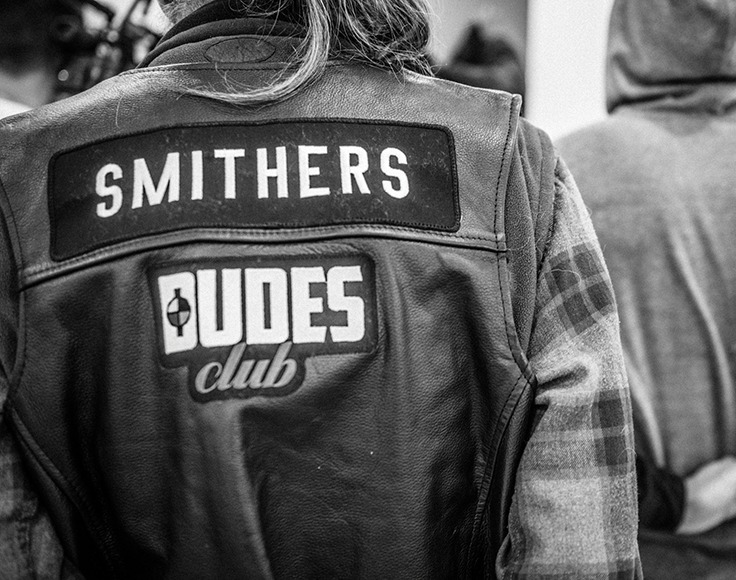
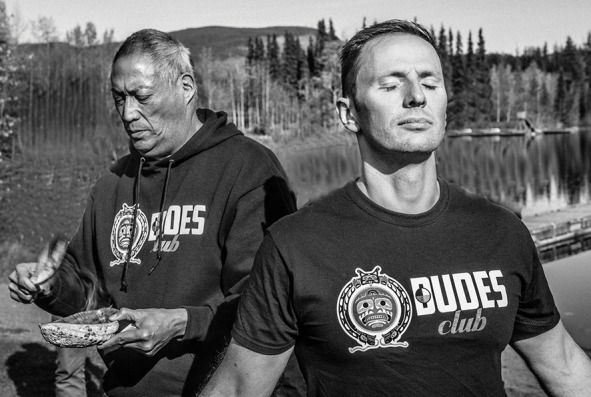
PHOTOS (LEFT) A DUDES Club member in his leather vest at a retreat in Smithers, BC.
PHOTOS (ABOVE) Dr Paul Gross (right) participating in a smudging ceremony led by elder Sandy Lambert at the Smithers retreat.
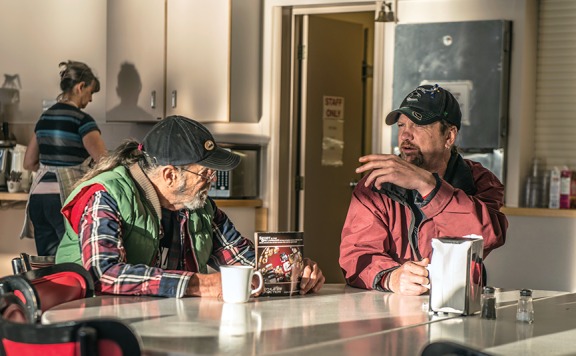
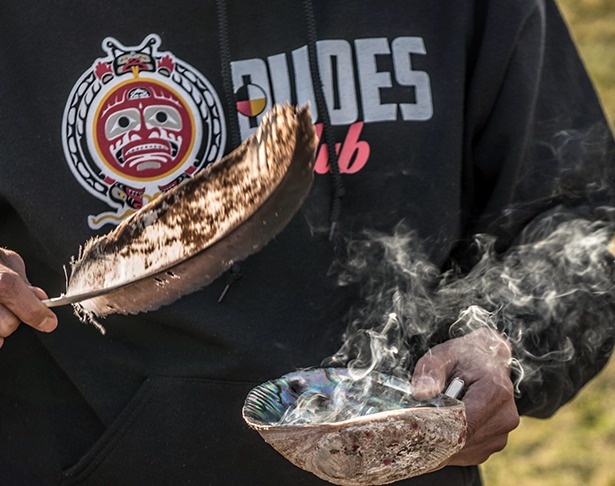
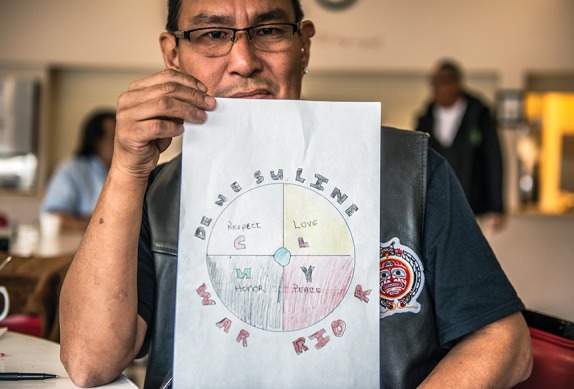
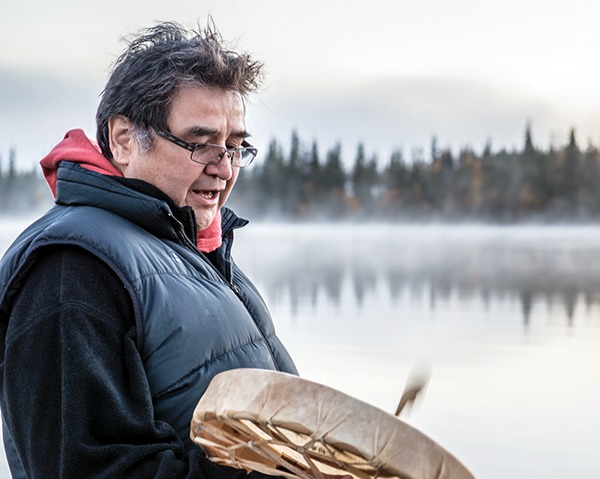
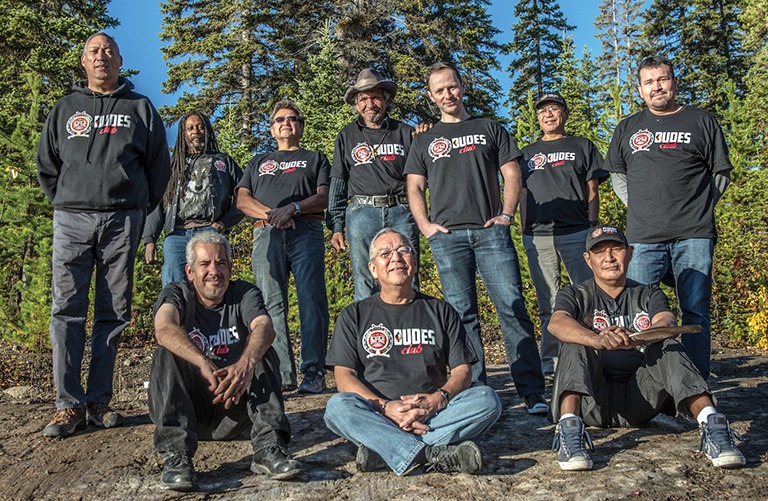
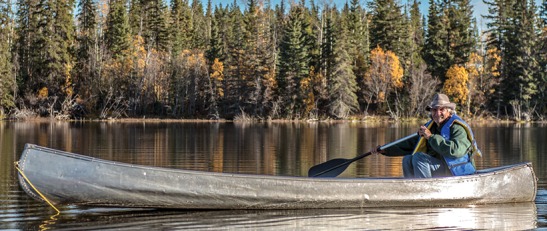
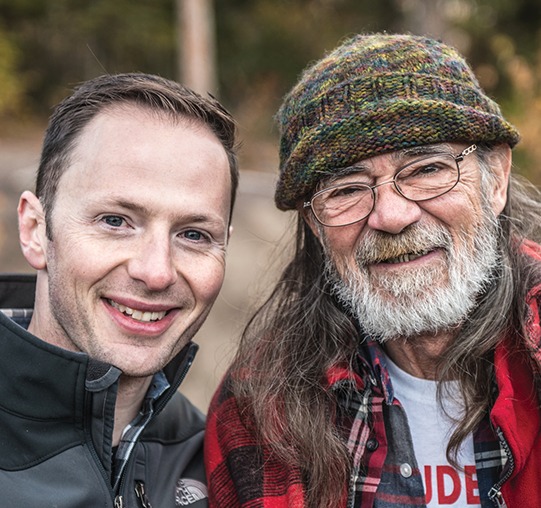
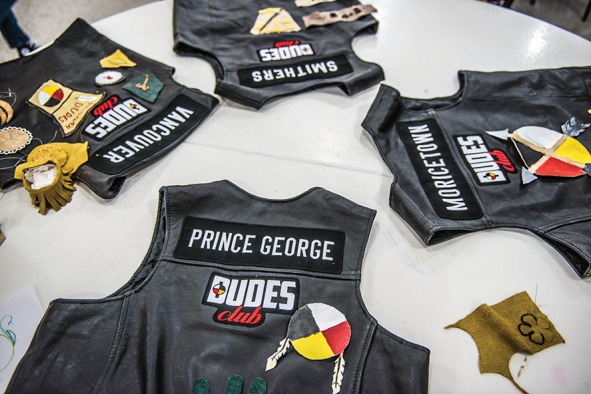
PHOTOS (LEFT, CLOCKWISE FROM TOP LEFT) The Dudes enjoy a coffee break; a traditional smudging ceremony; Gerry Adam shows his vest patch design; and Vancouver DUDES Club elder and Musqueam storyteller Henry Charles at the Smithers retreat.
PHOTOS (RIGHT) The Smithers retreat group (clockwise from top left) Sandy Lambert, Anthony Payne, Henry Charles, Jim Thomas, Paul Gross, Elmer Azak, Derek Harry, Gerry Adam, Rod George, and Robert Elkins; (centre) Jim Thomas enjoying a peaceful canoe ride; (bottom) Dr Gross with Smithers elder Steve Monds; DUDES Club vests representing the BC chapters.
PHOTOGRAPHER Jeff Topham, Vancouver, BC
Footnotes
La traduction en français de cet article se trouve à www.cfp.ca dans la table des matières du numéro de juin 2016 à la page e354.
The DUDES Club is a community-based health promotion program largely for indigenous men in the Downtown Eastside of Vancouver, BC. The program emphasizes indigenous perspectives on health by applying the medicine wheel approach to its activities and following the guidance of respected elders. The outcomes of the program thus far, as studied by the research team, are inspiring for any group wishing to focus on men’s health. The research team includes the following members. Dr Gross is a family physician working in downtown Vancouver at Spectrum Health, at the Vancouver Native Health Clinic, and at St Paul’s Hospital, and cofounder and Medical Director of the DUDES Club. Ms Patrick is a member of the Stellat’en First Nation in northwestern British Columbia and is also Acadian-Scottish. She is a doctoral candidate in the School of Community and Regional Planning at the University of British Columbia in Vancouver and Research Manager for the DUDES Club Evaluation Project. Ms Efimoff is a member of the Haida Nation and a research assistant with the DUDES Club. Mr Topham is a photographer and filmmaker based in Vancouver and is the director of the award-winning documentary Liberia 77. He has been documenting the DUDES Club since 2013.
The Cover Project The Faces of Family Medicine project has evolved from individual faces of family medicine in Canada to portraits of physicians and communities across the country grappling with some of the inequities and challenges pervading society. It is our hope that over time this collection of covers and stories will help us to enhance our relationships with our patients in our own communities.


